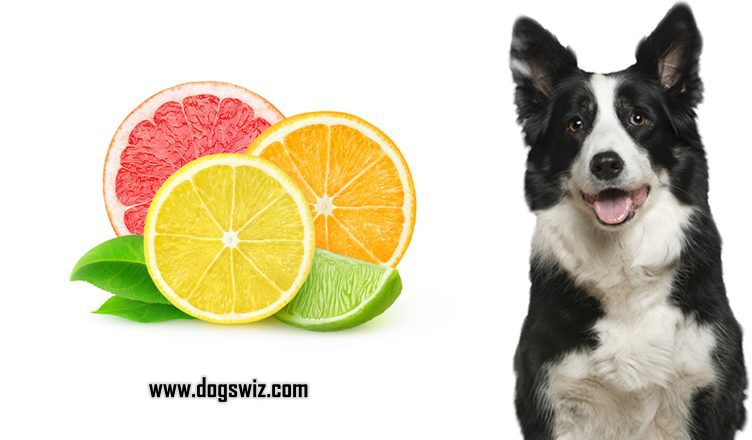Many people love to add citrus fruits to their dog’s diet, but does your pup have a stomach suited for eating it?
It turns out that dogs can eat citric fruits in small amounts without experiencing adverse effects. They would suffer from only minor stomach upsets at most, as long as they eat the citric fruit in moderation. This means you could give your dog an orange once in a while as a special treat, but make sure to keep the fruit treat under wraps. Citric fruits can be beneficial to dogs’ health if consumed in moderation. But feeding too much of anything is never a good idea. If your dog eats too much citrus, it could affect the pooch’s digestive system, nervous system and may lead to depression.
Citrus Fruits And Dogs – A Brief Overview
The key to understanding how safe it is for your dog to eat citrus fruit is to understand the basic components of their chemical makeup. Citrus fruits are composed of a high amount of citric acid, which is a natural cleansing agent. Citric acid also has antibacterial and antiviral properties. Additionally, most citric fruits are naturally rich in vitamin C. Eating small amounts of citric fruits can boost your dog’s immune system, keeping it healthy, promoting healing, and helping to fight off disease. It can also improve your dog’s digestion particularly when it comes to the passing of waste. But, all of these benefits are only viable to dogs that eat the citrus in small amounts.
Large amounts of citrus can lead to an upset stomach, diarrhea, vomiting, and nausea which is not good for your dog. In addition to the gastrointestinal issues, excess citrus could lead to irritation, weakness, lethargy, depression, tremors, collapse, and even sudden death. So, monitor the amount of citric fruit your dog eats closely. Too much citrus could prove fatal to the pups’ health, so make sure you feed your dog the right amount.
Citrus fruits – Peel, Seeds, And Plant
It’s a wise idea not to feed the seeds and peel of the citric fruit to dogs. Dogs can have a hard time digesting the peel of the fruit, and if they eat large portions of the peel it could also lead to choking and intestinal blockage. Furthermore, the peel might contain small amounts of pesticides which are harmful to dogs.
The seeds on the other hand contain trace amounts of cyanide, which is harmful to your dog. While swallowing one or two seeds by mistake shouldn’t be much of an issue, it’s better not to take the risk. In quantities that are large enough, the seed could be fatal for dogs. If you do decide to feed your dog citrus fruits containing seeds, make sure to remove the seed thoroughly before feeding it to them.
As for the plant itself, dogs should never eat the leaves or stems of the citrus fruit. Lemon and lime plants produce the phototoxic compounds psoralens as well as linalool and limonene. Although safe for human consumption, these substances are potentially toxic to canines in high concentrations. Pups that eat too much of the plant might suffer from irritation to their gastrointestinal, nervous, and respiratory systems. These pups may also suffer from congestion, headaches, and depression.
Citrus Fruits – The Perfect Amount
It’s best to consider citric fruits as treats rather than a regular addition to your dogs’ diet. When it comes to feeding citric fruits to dogs, we recommend you follow the 10-percent-rule of dog treats. According to this rule, you should feed your dog a maximum of 10 percent of his/her daily calories’ worth of any kind of “doggy treat” to avoid digestive upset. Start with a small amount, no matter what the fruit and of your dog seems to enjoy eating the fruit, you could feed them just a little more the next time.
But in the event your dog eats a large amount of citrus or shows any adverse reactions even after eating a relatively small amount of the fruit, you should stop feeding it to them completely. If they show symptoms of nausea, vomiting, diarrhea, or a decrease in appetite after one or two days of their last feeding of citrus fruit, then you should take them to see a veterinarian. In the vast majority of instances, your vet will likely recommend discontinuing the citrus fruit treats.
Conclusion
All things considered; citric fruits are beneficial to dogs when in moderate amounts. Dogs can eat any citrus fruit without experiencing any adverse effects as long as they eat it in small amounts. Citrus fruits are only harmful when in large quantities, they can lead to stomach upset, gastrointestinal issues, lethargy, and even death in some cases. Make sure you follow the 10-percent rule of dog treats in order to avoid stomach upsets or other harmful effects your dog might experience when eating citrus fruits.
To explore more, here are some orange-related articles for dogs that you might be interested in.
Have you ever tried giving any citrus fruits to your dog? Did they like it? We would love to hear from you. Please share your experience with us by leaving a comment below!
